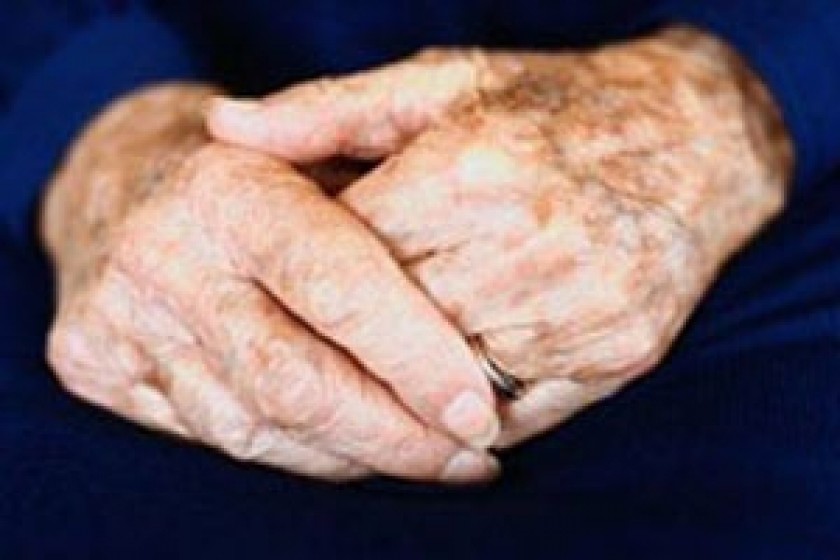
You Can't Fight the World
Grandmother Siranush (the last names of most of the elderly in this article have been omitted at the request of the staff) is the only resident of the retirement home who has higher education. A candidate for a PhD in Medicine, she is spending her last days far from her home, her children, and what had been a wealthy past. Three years ago, her daughter brought her from Yerevan to this retirement home in Vanadzor and asked that they admit the 82-year old woman immediately. "I don't consider her a criminal. She did the right thing in bringing me here. She couldn't look after me at home," said Siranush, who raised two children. She kept trying to justify her daughter's decision, continuously repeating, as if to convince herself, that families do not like to care for the elderly. And they are not obliged to, either, for it is difficult to get along with the elderly and nobody likes old age. "Old people have their own particular character, they love themselves more, and that leads to conflict between them and the younger generation."
Siranush repeatedly emphasized that she had been the wife of a government minister. "I have now become like people who don't know about anything else but their own lives. I am a minister's wife, while she is the wife of a laborer. Yet we have both become residents of this old age home."
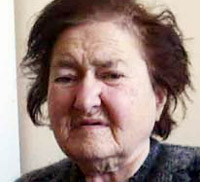 |
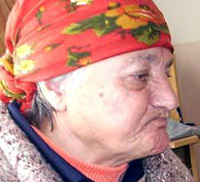 |
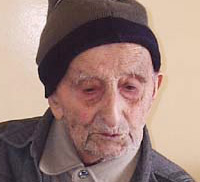 |
| Siranush | Vardush Barseghyan | Vakhtang Aslikyan |
The minister's wife was a lecturer at the Yerevan State Medical Institute for many years and headed a department at the Institute of Oncology. Her husband died while she was still young, then she lost a child, and now she is spending her old age within strange walls. She does not know where her grandchildren are now. She has no news from her daughter, either. She said that at their last meeting, her daughter promised to visit more frequently. "But it wasn't true. She doesn't know the meaning of visiting." Her daughter was unable to care for her, bathe her, or dress her, and life at the retirement home is not that bad. There is a daily schedule, a fixed time for meals; the rooms are cleans and bathrooms are convenient.
Siranush believes that everything she learned during her life has vanished, and the only thing she can do now is talk. She can no longer change anything.
70-year old Vardush Barseghyan suffers from memory loss and can only remember a few episodes from her childhood. She grew up in an orphanage. "When Stalin died, all the children cried," she said, nearly breaking down as she remembers that sad day. She left the orphanage, got a job, got married, and had three children. Her family is in Moscow now. "They didn't take me, because I was hit by a car and was bedridden for a long time," she said, probing her memory for the names of her husband, children and grandchildren. She misses her children a lot and wishes for nothing but to see them, but they never even call her.
Vakhtang Aslikyan, the oldest resident at the home, is also seldom remembered by his relatives. The old man misses his son, and is waiting for a thaw in the weather so that he can travel to Yerevan. Grandfather Vakhtang will turn 100 in 2007. The home has decided to have a big celebration in honor of the centenarian's birthday.
"He is a kind and somewhat defenseless old man," they said of the former forester. Vakhtang owned houses in Georgia and was a farmer. Then he came and settled in Yerevan. He never remarried after his young wife died. He says that many women sought his hand, but he did not let any of them "come near". His relationship with his children grew progressively worse, and he ended up at the retirement home six years ago. His daughter died a few months after bringing her father to the home. Unlike other residents of the home, Grandfather Vakhtang wears a suit his son gave him and has not been forced to part with his pension. His son visits him a few times a year.
82-year old Grandfather Simon is waiting for his grandson's return from Russia. "He said 'I will come in May. Arrange for a girl so that I can come and marry her,'" said the father of three proudly. His children never visit him. His grandson lost his mother and was raised by Grandfather Simon and his wife. He grew up, served in the army and then left for Russia. Simon's wife died and his son took him to Ukraine, but after spending the winter there, Simon decided to return to Vanadzor. "I am an old man, who can look after me? Who will wash my clothes? Who will cook for me? Here, they take care of everything."
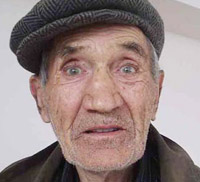 |
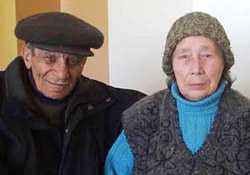 |
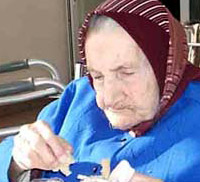 |
| Grandfather Simon | Sofik Saribekyan and Raphael Armaghanyan | Anahit Arakelova |
94-year old Anahit Arakelova came to the retirement home, in her own words, for peace and quiet. "She was the mother of a general," they said of her at the retirement home. She decided to return to Vanadzor from Tbilisi two years ago because her daughter was not well off and could not afford to look after her. Anahit provided for an education for all four of her children. Two of her sons have already died, one daughter is in a psychiatric hospital, and the other is in Tbilisi. Anahit is a native of Vanadzor, but grew up in Georgia. She met her soldier husband there and they settled down. Her eyes lit up when she recalled her husband. "He wasn't just a husband, he was a miracle!"
Sofik Saribekyan got married, for the first time, at the retirement home, when she was 75 years old. Raphael Armaghanyan, one of the senior residents of the home took the ailing, lonely woman as his wife. "The younger people find it amazing, but we live like sister and brother," Sofik confessed and recalled how many envious people had opposed their union. Armaghanyan, a father of three daughters, regrets never having had a son. "If I'd have had a son, he would've looked after me," said the old man, who is very caring towards his third wife and has surrounded her with love for five years now.
41 of the 53 residents of the home have children. The regulations of the home are such that they are obliged to admit only those elderly citizens who have no children. However, the management is often forced to bend the rules and provide residence to aged individuals who have children or other relatives as well. Sixty per cent of the residents are women. The retirement home was founded by the Aznavour pour Armenie fund and has been functioning for 13 years. Since 2002, the home has been under the patronage of the USA Armenian Relief Fund. For four consecutive years, the costs of running the home, which amount to US $90,000 annually, have been covered by Diasporan Armenians Gevorg and Sirvard Garamanukyan. Donors from abroad provide aid whenever renovation and other expenses arise. Using their resources, the roof was renovated last year and a laundry room was built.
50,000-55,000 Armenian drams are spent on each resident every month. State support is limited to the pension of each resident for his or her daily needs, but this is very often taken by relatives. "Their relatives are indifferent towards them. They often don't even attend their funerals," said M. Ohanyan, the accountant at the home, shaking her head.
The number of residents of the retirement home remains constant. Every year around ten residents pass away, and an equal number are admitted.
"This is our world. There is no other world for us," mused Siranush, the only professor at the Vanadzor retirement home. "You can't fight the whole world... this is the way things are."
 Videos
Videos Photos
Photos
Write a comment